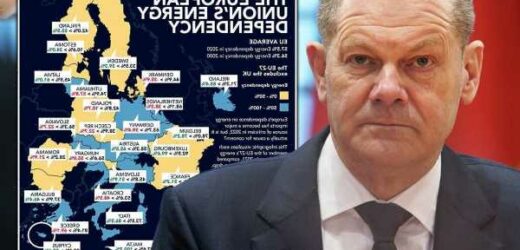Economist explains why Germany is still using Russian gas
We use your sign-up to provide content in ways you’ve consented to and to improve our understanding of you. This may include adverts from us and 3rd parties based on our understanding. You can unsubscribe at any time. More info
While the EU scrambles to wean itself off Russian energy amid the Ukraine war, it appears some members of the bloc will have a tougher time than others. And with Germany needing to import nearly 65 percent of its energy to power its homes and economy, it helps to explain why Berlin has been opposed Russian sanctions in this industry. Of those imports, around a third of Germany’s comes from Russia, as does 34 percent of its crude oil.
And the country has been one of the major voices against an immediate ban on EU gas and oil.
This is despite the European Parliament voting overwhelmingly in favour of an immediate embargo to all of Putin’s hydrocarbons.
And even as the European Commission, which came under fire from EU Parliament, eyes up oil sanctions in its next package, Berlin still appears resistant.
A group of 50 MEPs were outraged by this stance, and signed a furious letter to German Chancellor Olaf Scholz to try and change his mind.
It reads: “We find it hard to believe that the proud German nation, which strongly supports Ukraine and in huge majorities demands sanctions on Russia, is satisfied with such policy line of the German Government.”


It adds: “We understand that Germany may feel targeted by Putin’s threats to cut gas supply to your country if the EU oil embargo is introduced.
“However, Germany, and the EU, should not prove themselves vulnerable to Putin’s blackmail.”
Co-signatories of the letter include Lithuanian Prime Minister Andrius Kubilius, Spanish MEP and economist Luis Garicano, and Belgian MEP Guy Verhofstadt.
It continues: “Thus, we ask the German Government to take a stand on the right side of history; not to make an easy decision, but the right one.
While Germany is concerned about an immediate ban, it has indicated that it will eventually be ready to reduce its dependence on Russia.”
But whether it will submit to the bloc’s REPowerEU energy strategy, which details how it will slash oil and gas imports from Russia by two thirds by the end of the year, remains to be seen.

Vice-Chancellor Robert Habeck has claimed that Germany can cut its imports of Russian oil in half by midsummer.
He also claimed Germany could completely phase out Russian gas by the middle of 2024, despite the EU’s goal to slash oil and gas imports altogether by 2027.
And a tougher stance on energy was prompted by Russia’s war crimes committed in Bucha.
German Defence Minister Christine Lambrecht said during a TV interview earlier this month: “There has to be a reaction.
DON’T MISS
Mysterious liver disease cases could be linked to virus outbreak [REPORT]
Bulgaria and Greece break EU ranks with new nuclear plan [INSIGHT]
Macron’s grip on Britain’s energy exposed – France to gain billions [REVEAL]


“Energy sanctions are among the things that will be discussed.”
But no gas or oil ban was imposed by the bloc, instead opting for sanctions on coal that will take effect in mid-August.
Hungary, which imports nearly 57 percent of its energy, is also opposed to sanctioning Russian energy,
Its President, Viktor Orban, has warned that these would be a “red line” that could “kill Hungary.”
Source: Read Full Article

